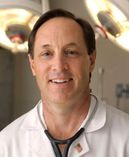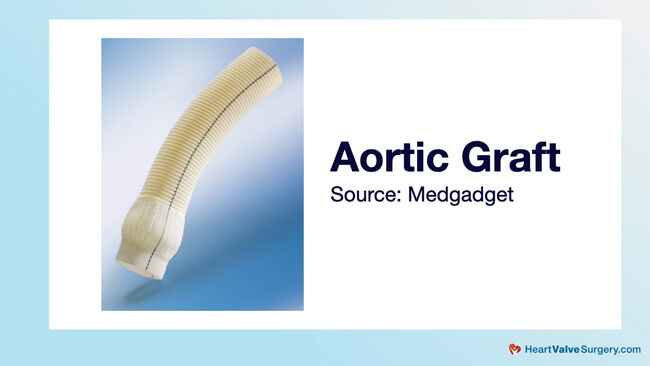Surgeon Q&A: Can Dacron Aorta Grafts Calcify After Bicuspid Aortic Valve Repair Surgery?
Written By: Adam Pick, Patient Advocate & Author
Medical Expert: Kevin Accola, MD, Cardiac Surgeon, AdventHealth
Published: January 18, 2023
We just received fascinating questions from Nikki, the mother of a heart valve surgery patient. Nikki wrote to me, “Hi, Adam. My son had a bicuspid aortic valve repair and an aneurysm repair with a Dacron graft. Will this graft last forever or does it eventually calcify? Will he eventually require another operation during his lifetime?”
To provide Nikki an expert response, I connected with Dr. Kevin Accola, a leading cardiac surgeon at AdventHealth in Orlando, Florida. During his incredible career, Dr. Accola has performed over 14,000 cardiac procedures with more than 8,000 operations involving heart valve repair and replacement therapies.
Key Learnings About Dacron Aorta Grafts
Here are several important learnings from our discussion with Dr. Accola:
- Patient questions about calcification are typically specific to heart valves. Dr. Accola states, “This is a great question because we talk a lot about the valve procedure itself and its longevity. But, I’ve got to say not too many people inquire about the graft – which is a very valid point.”
 Dr. Kevin Accola (Heart Surgeon)
Dr. Kevin Accola (Heart Surgeon)
- Aorta grafts are made from synthetic materials which facilitate the flow of blood through the body. A graft is often used to repair or replace a section of the aorta which may bulge or swell. This is called an aneurysm and can be a life-threatening defect if the aorta is tears or dissects.

- While a Dacon graft may fibrose (form fibrous tissue), it is rare that the graft will calcify. “Sometimes it does calcify, but really, in very unusual circumstance,” states Dr. Accola. “Typically, it creates a fibrosis within the graft or around the graft itself. Rarely is calcification a problem or a concern in these patients who’ve had a Dacron graft replacing an aorta.”
- In response to Nikki’s follow-up question about whether her son may need a reoperation following his bicuspid aortic valve repair, Dr. Accola suggested that there is no specific answer to that question. There is longevity variability of the valve depending on the surgical technique, valve anatomy, valve structure and leaflet mobility. However, should the valve become stenotic or regurgitant, there is a possibility that a reoperation may be needed in the future.
- Considering that a bicuspid aortic valve is genetic, Dr. Accola suggests that the child’s sibling should be screened for this valvular defect.
- Dr. Accola’s advice for Nikki is to ensure that her son gets regular annual echocardiograms to monitor his aortic valve repair and cardiac function. “My recommendation of going forward is Nikki’s son needs to be followed up annually at least with an echocardiogram and an exam by their physician just to be sure that there’s no changes in the valve, that it’s gotten thickened or fibrotic or leaking valve,” states Dr. Accola.
Many Thanks Dr. Accola & AdventHealth
On behalf of our patient community, many thanks to Dr. Kevin Accola for taking the time to share his clinical research and experience with us. In addition, we would like to thank the entire AdventHealth team for taking such great care of the patients from HeartValveSurgery.com.
Related Links:
Keep on tickin!
Adam
P.S. For the deaf and hard of hearing members of our community, I have provided a written transcript of Dr. Accola’s interview below.
Video Transcript:
Adam Pick: Hi, everybody. It’s Adam with heartvalvesurgery.com. Today we’re answering your questions all about bicuspid aortic valve repair, aneurysms, and the potential calcification of Dacron grafts. I am thrilled to be joined by Dr. Kevin Accola, who’s a leading cardiac surgeon at Advent Health in Orlando, Florida. During his extraordinary career, Dr. Accola has performed over 14,000 cardiac procedures with more than 8,000 involving some form of heart valve repair or heart valve replacement. Dr. Accola, it is wonderful to see you again. Thanks for being with us today.
Dr. Kevin Accola: Adam, thank you. It’s always a privilege to be with you. Heartvalvesurgery.com has been such an instrumental thing for our patients.
Adam Pick: Dr. Accola, we’re going to get to the patient’s question, but first, I want to take a minute and acknowledge you and your entire team there at Advent Health. We’ve known each other now for over ten years. You are one of the first surgeons to support our educational mission and in addition to that, Dr. Accola, you and your team have treated, successfully treated so many patients with heart valve disease from our community. On behalf of everybody here, thanks so much for supporting us.
Dr. Kevin Accola: I appreciate that, Adam. I’ve always been an advocate of community-based grassroots educational processes, which you initiated. It’s been so successful and our patients are so appreciative. It’s really helping patients reach out to other patients. That’s so important.
Adam Pick: Dr. Accola, let’s get to Nikki’s question. It’s a great one. She asks, “Hi, Adam. My son had a bicuspid aortic valve repair and an aneurysm repair with a Dacron graft. Will this graft last forever or does it eventually calcify?
Dr. Kevin Accola: Nikki, that’s a great question because we talk a lot about the valve procedure itself and the longevity of that, but I’ve got to say not too many people inquire about the graft, which I think is a very valid point. The Dacron graft is made of a synthetic product that, yes, it can fibrose some and it might get a little stiff and noncompliant. Really, that’s a mechanism of repairing or replacing the aorta to become the conduit from the heart to the rest of the body. Sometimes it does calcify, but really, in very unusual circumstance. Typically, it creates a fibrosis within the graft or around the graft itself. Rarely is calcification a problem or a concern in these patients who’ve had a Dacron graft replacing an aorta.
Adam Pick: Dr. Accola, Nikki, as a mom, has a wonderful follow-up question for her son, which is, “Will he eventually require another operation during his lifetime?”
Dr. Kevin Accola: Nikki, that’s a very fair question. Those are some things that we can’t answer with an exact years of longevity of the valve. Oftentimes, the valve that can be repaired is repaired because it provides the capability of not requiring a valve replacement until possibly later in life or other technologies that may become apparent or available later in life. In regards to the bicuspid valve, it all depends on the anatomy of the valve. If the leaflets themselves remain mobile and structurally sound, that valve could last many, many years. Sometimes though, the leaflets can become thickened, and in a bicuspid valve, the calcification processes can occur. Yes, there’s a possibility that he may require a reoperation at some point to address the valvular problem, i.e., if it becomes leaking valve or if it becoming a stenotic valve. Then at that point, it would just require another operation to most likely then replace the valve.
Adam Pick: Dr. Accola, great point. Now I’ve got to ask you the question for Nikki and her son. What would be your recommendation for them going forward?
Dr. Kevin Accola: Adam, my recommendation of going forward is Nikki’s son needs to be followed up annually at least with an echocardiogram and an exam by their physician just to be sure that there’s no changes in the valve, that it’s gotten thickened or fibrotic or leaking valve. The other thing I think that Nikki should look into is a bicuspid valve can be a congenitally genetically induced or inclined circumstance with valvular pathology. The other children or siblings should be checked with an echo at some point, particularly if they’re getting involved in any athletic type of events. I think that once they’re screened and everything is okay, then they shouldn’t have to worry about that.
Adam Pick: Dr. Accola, it’s so very important for patients with bicuspid aortic valves to have their families get screened. Thank you for bringing that into this conversation. Dr. Accola, on behalf of all the patients at heartvalvesurgery.com, all the patients all over the world watching this, I want to thank you for taking time away from your very busy practice there at Advent Health and sharing all of this wonderful research and clinical experiences with our community. Thanks for being here today.
Dr. Kevin Accola: Adam, thank you. It’s always a privilege. It’s just such a pleasure always to see you as well. It’s great catching up. Thank you for allowing me to participate in your program today.




